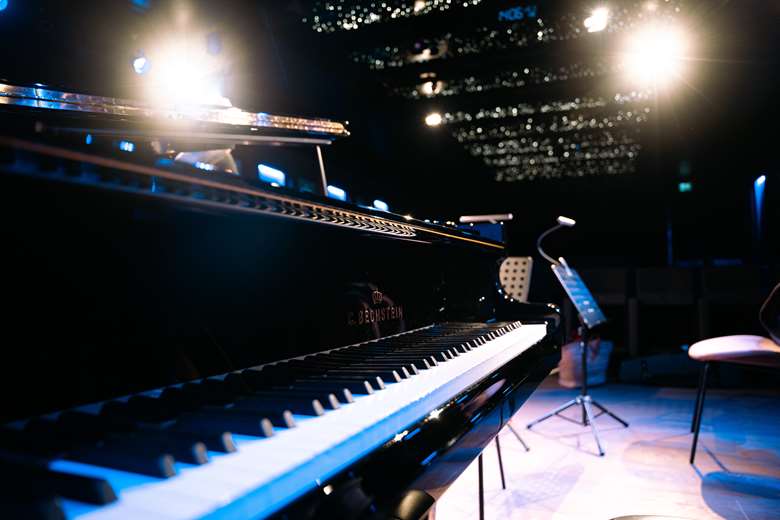Small but perfectly formed
Simon Mundy
Tuesday, December 17, 2024
Simon Mundy explores London’s brand-new Bechstein Hall, which offers a compact classical experience for select audiences near Oxford Circus

Like fish restaurants along a promenade, London is quietly assembling its chamber music venues around Wigmore Hall. Before World War I, the Wigmore had been built and served as the showcase venue for the Berlin piano maker Carl Bechstein. Now that company has re-emerged onto Wigmore Street with a miniature venue 50 yards closer to Cavendish Square. It is not the only piano maker in the area; Steinway is across the road (and has its own occasional young artist's series), and Blüthner has its showroom at the other end of the street in Portman Square.
Bechstein Hall, though, is the first of them to host a full-time concert room below its new showrooms. The hall itself is unlike any other. It seats just under 100, facing a compact stage with room for a big piano and perhaps two other instruments. Those in the front row of the audience are almost close enough to turn the pages – and the noise from a full size piano with its lid open and the traditional brittle Bechstein touch is often overwhelming (think wearing headphones with the volume turned up high). However, the acoustics are electronically manipulated so it is hard to judge whether the sound assault was the fault of the piano or the sound system. Either way, these elements are sure to be tweaked as the venue matures.
 (Image courtesy of Bechstein Hall)
(Image courtesy of Bechstein Hall)
The hall itself feels more like a film screening room than a music salon, with raked cinema style seating. Digital panels line the dark walls, listing the music being played (there are no explanatory programmes) and, before the players emerge, playing a short video from actor Edward Fox, reminding (or admonishing) the audience to turn their phone screens off for the performance.
Whereas the Wigmore Hall has a gorgeous mosaic above the platform, the Bechstein Hall's is dominated by a huge version of Bechstein’s signature crown. The backstage area allows only for one small, but well-equipped, dressing room. Bechstein were completely in charge of rebuilding the property, so it is surprising that so many of the rooms feel cramped and low ceilinged. Although this can perhaps be explained by the building’s central London location, somewhere in the process the architect needed a more generous brief.
 (Image courtesy of Bechstein Hall)
(Image courtesy of Bechstein Hall)
Not only is the layout unusual, so is the concert format – and in that the arrangements are much more successful. During the week an hour-long concert is given twice in an evening, at 6.30pm and 8.30pm, with ticket prices ranging from £30 to £60, and on two days the concert is reserved for piano music. The idea is to give patrons the time to eat in the building’s extremely fine restaurant (£59 for two 5 star courses) either side of the performances. On Saturdays, there is just one full-length concert starting at 7.15pm, with dinner beforehand, and on Sundays a 2pm concert with roast.
The artistic direction will be crucial and so far, it is highly promising. Handled by Luka Okros, himself an emerging pianist, originally from Georgia who can be heard playing on 11 January. In these early months he has been trawling through his contacts and has established a roster of accomplished but not yet immediately recognised performers. My introduction to the hall on 14 December featured the London debut of violinist Alexandra Tirsu, a prize-winner two years ago in Munich's prestigious ARD International Music Competition. Since then, she has been playing all over the world – except London. Her recital, accompanied by Ilya Kondratiev, included a magnificently romantic reading of the Franck Sonata and the daunting virtuosity of Ginastera's Pampeana No.1, both of which had featured in her Chicago recital earlier in the week. She is a violinist the London orchestras would be wise to take a look at.
 (Image courtesy of Bechstein Hall)
(Image courtesy of Bechstein Hall)
While the main business of the building, selling Bechstein pianos (and its other two brands, Zimmermann and W. Hofmann), it also has a few practice rooms for hire at £23 per hour, a useful new resource in a city where such places are rarely easy to find. Downstairs, too, is a room laid out in cabaret style, not yet in use but which could be a congenial informal performance space. It is closer to how I had imagined the main hall in the basement; flexibly arranged for relaxed interaction between musicians or speakers and audience. For that, for now, listeners will need to head around the corner for the genuine salon that the Nicholas Boas Charitable Trust organises in Mansfield Street.

The Bechstein Hall is modern and corporate in design and uses all the technological gizmos, but as yet feels stiff – as if it aims to uphold an image of classical music as a luxury product of the hospitality industry. The team managing the venue, led by the head of Bechstein UK, Terence Lewis, does seem to have a very definite lean towards the business world and perhaps that is necessary, given the prices that need to be charged for tickets and meals. The target audience is clearly not one worried about accessibility barriers and concerts do sell out. Punters are likely to relish that sense of exclusivity.
Whether that judgement proves to be right, only time will tell. For the moment one can only welcome another venue that genuinely gives emerging musicians a chance to play to people who appreciate their talent, and who probably have the money to help their careers progress if the experience is encouraging.


